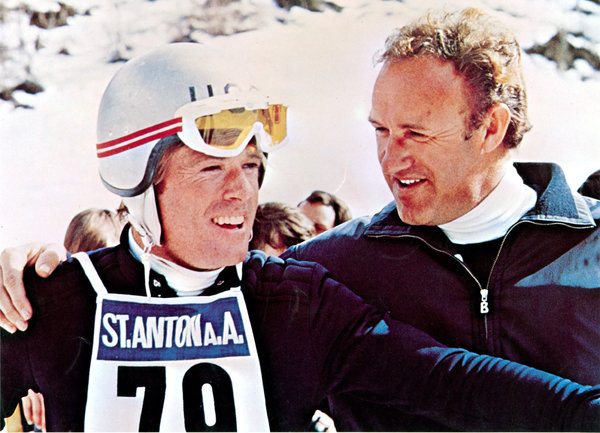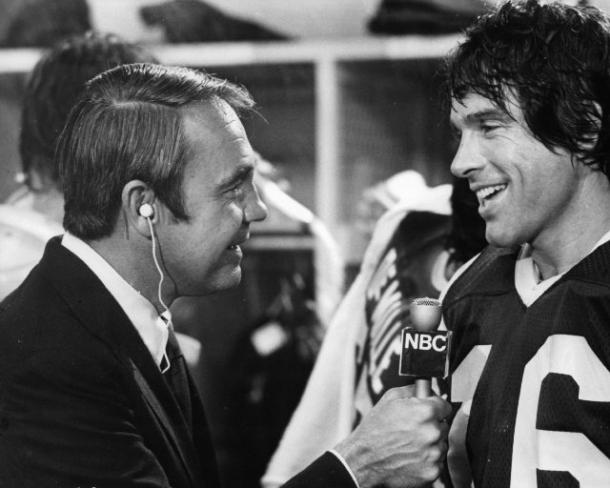The Oscars are handed out this Sunday, and all week long ESPN has been promoting the telecast airing on sister network ABC (both are owned by Disney). What’s weird is that it’s not that weird. The sports and entertainment industries have been intrinsically entwined for a while now. Maybe that’s why sports movies today lack the casual realism of films from the 60s, 70s and 80s when professional franchises weren’t billion dollar businesses and live sporting events were more hassle-free and accessible. Creed, criminally underrepresented at this weekend’s ceremonies, tries to recreate the feel of classics like Slap Shot, Hoosiers and Rocky-Rocky IV, films that depict their sports in a broader human context. Here are some other old-school gems that comment on sports in interesting ways.
The Split (1968)
The Split opens with Cleveland Browns legend Jim Brown (in his first starring role) racing through the desert to a scorching Billy Preston title track. The car breaks down and he’s forced to take the bus, but he arrives in time to lead an elaborate score: robbing the Los Angeles Memorial Coliseum—box office, concessions, souvenirs, everything—during a playoff game between the Los Angeles Rams and the Green Bay Packers. The requisite “assembling the team” bit plays out like locker room hazing with Brown’s McClain abusing each accomplice to test his worthiness. There is much joy in watching one of the greatest football players of all time coolly casing the Coliseum like he owns the place. The back and forth cutting between the heist and the game is superbly edited. The action on the field predicts the outcome of the plot when Green Bay storms back late to spoil the hometown Rams’ hopes. “Either we’re all locked in, or none of us are,” McClain tells his gang, and the caper goes off without a hitch. But, like a football game, The Split is a tale of two halves. Egos, mistrust and greed inevitably spoil the winning formula. More than anything, the film evokes nostalgia for a time when you could saunter up to a box office day-of and buy a ticket to an NFL playoff game for $7.00.
Downhill Racer (1969)
Wheels groan as a lift ascends to snowy mountains. Deep quiet envelops the top where a lone skier waits in the gate. By the end of the opening credits. he’s in intensive care. Downhill Racer is a pitiless, unsentimental sports movie, as cruelly beautiful as the jagged peaks its athletes try to conquer. Despite featuring some of the most heart-pounding race footage ever photographed, it’s a quiet, lonely film - essentially a character study of a would-be champion. Robert Redford masterfully captures the fearless emptiness required of any athlete in any sport striving to be elite. He plays Dave Chappellet, a replacement skier who arrives without fanfare to join the U.S. Men’s Ski Team mid-season. He’s the next man up, another cog in the wheel. The viewer learns next to nothing about downhill skiing or its rules. None of that matters to Chappellet who knows he’s good, but not the best. Gene Hackman plays the coach who can help him get there. Their wary dance, strained, but symbiotic, forms the cold heart of the film. “Don’t expect to be given the world,” Hackman barks after Redford places fourth in an early race. “I don’t expect to be given anything,” Redford snarls. “Good. Get in the bus.” That exchange comes full circle in a final sequence that plumbs every conflicting emotion a competitor can feel, vaulting Downhill Racer among the best sports films of all time.

Heaven Can Wait (1978)
Ten years after The Split, the L.A. Rams are still waiting for that elusive championship. With rising star QB Joe Pendleton (Warren Beatty) it could finally happen. But a movie plot gets in the way. Moments before a bicycle accident, an overzealous angel spirits Joe to heaven to spare him the pain of death. Trouble is, the angel didn’t realize Joe’s athletic reflexes would’ve saved him. It wasn’t his time. So the boys in white do the next best thing: stash him in the body of an old millionaire until they figure out how to fix it. As Leo Farnsworth, Beatty buys the Rams and leads them to the Super Bowl against the Pittsburgh Steelers. Beatty played high school football, so he’s in his element here. The football and locker room scenes have a breezy authenticity with several former Rams greats suiting up—including Hall of Fame defensive end Deacon Jones. When Beatty-as-Farnsworth takes over as quarterback in practice, the right tackle slyly steps aside to let Jones clean his clock. Heaven Can Wait was nominated for eight Oscars, but only won for art direction. Two years later the Rams would meet the Steelers in the real Super Bowl. Too bad Warren Beatty wasn't’t quarterbacking.

The Fish That Saved Pittsburgh (1979)
Forget the plot. No, don’t. It’s too insane. Halfway through a dismal season, the Pittsburgh Pythons replace their disgruntled players with amateurs born under the sign of Pisces, the same sign as their only star player, Moses Guthrie (Philadelphia 76ers legend Julius “Dr. J” Irving—an actual Pisces). They go on a miraculous winning streak, hire a team astrologer, change their colors to silver, baby blue and pink, and make it all the way to the Finals, arriving in a hot air balloon to play against the Los Angeles (don’t say it!) team. L.A.’s black and purple unis are more Sac-town than Showtime, but Kareem Abdul-Jabbar shares the court with Norm Nixon, and iconic Los Angeles Lakers announcer Chick Hearn calls the play-by-play. Released at the tail end of the disco era in the golden film year of 1979 (the same year Jerry Buss bought the Lakers), it has more in common with Roller Boogie and Xanadu than your typical sports comedy. It’s not a great movie, but it’s a fun time capsule of a faster, looser, more freewheeling NBA before the three point shot. How can you not love a movie in which a player lifts his jersey to show the words “TRADE ME” painted on his chest? And the scene where Moses defends his honor on an empty public court—a nighttime montage of dissolving drives and dunks on a chain link hoop in street clothes with a slam poetry voiceover and the Spinners’ “(Do it, Do it) No One Does It Better” on the soundtrack—well, it's pure cinematic swag.
…All The Marbles (1981)
The California Dolls are a female tag-team wrestling duo living the leotard dream in seedy auditoriums fighting for peanuts. Despite the B-movie set up (the girls get conned into a mud wrestling gig), the movie avoids T&A clichés, opting for a warm but gritty chronicle of tenacious conviction. The naturalistic cinematography grounds the Dolls’ struggle to escape their low-rent road life in gorgeous long shots of blue collar Ohio cities like Youngstown and Akron where factories casually churn out smoke over Lake Erie. It’s a world of dying small towns, rusted-over bridges, shabby dressing rooms and cheap motels. …All the Marbles nails the complex relationship between athlete and manager, one built on deferred dreams, cheap food, muffler fumes and mutual respect. The final Reno grudge match against their nemeses The Toledo Tigers builds to rousing, well-earned climax with cameos by “Mean” Joe Greene and announcer Chick Hearn. Peter Falk beautifully underplays the feckless but well-meaning manager Harry Sears, but it’s Vicki Frederick and Laurene Landon as the California Dolls who bring the wood to this surprisingly touching film.
Fletch (1985)
Fletch? It’s a comedy classic with a funny Lakers dream sequence, but a sports movie? Look again. Upon closer inspection, the Los Angeles Lakers are more deeply embedded in the framework of the story than a set of 49-cent novelty teeth. The film opens with investigative reporter Irwin Fletcher (Chevy Chase) walking up the beach in June gloom past the Santa Monica pier pilings, a ragged hero in a faded, tattered #32 purple away jersey. “Magic today, huh?” asks his faithful girl Larry (Geena Davis). “Yeah, Kareem’s in the wash,” he replies and asks aloud for the point spread. The jersey is a suit of armor Fletch adorns to delve into the shady corruption lurking under the glitzy L.A. sunshine. The Showtime Lakers represent all that is good and true in a dishonest world. Lakers memorabilia crop up like talismans aiding the hero in his quest. After revealing her husband’s plot to the heroine, Fletch softens the blow by asking her to a Lakers game. When he breaks the beach drug-trafficking story, he’s wearing an autographed T-shirt from the 1983-84 Western Conference Championship. “I’m sick of this place,” he moans. “I’m going to try out for the Lakers. They need a power forward.” (Apologies, Kurt Rambis and Mitch Kupchak). In the finale when the villain Stanwyk poses as Fletch’s double, his brand-new Magic Johnson jersey symbolizes his phony slickness. Fletch opened on May 31, 1985, in the midst of the NBA Finals. The night before, the Lakers stole Game Two on the road to even a series they would go on to win, the first time the Los Angeles Lakers ever beat the Boston Celtics for a title.








































